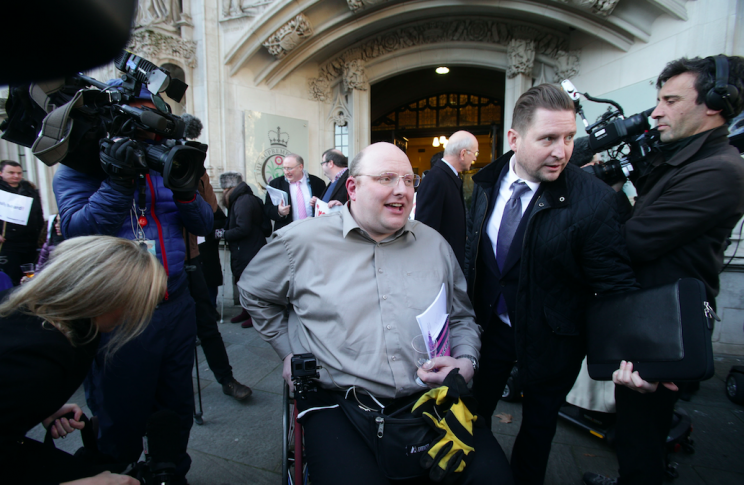Wheelchairs users in legal victory over pushchairs over who gets priority space on buses

A disabled man has won a partial victory in his battle for priority use of wheelchair spaces on buses.
The case was triggered when wheelchair user Doug Paulley, from Wetherby, West Yorkshire, attempted to board a bus operated by FirstGroup which had a sign saying: ”Please give up this space if needed for a wheelchair user”.
However, Mr Paulley was left at the stop because a woman with a sleeping baby in a pram refused to move out of the designated area when asked by the bus driver, telling him the buggy would not fold.
FirstGroup has a policy of ”requesting but not requiring” non-disabled travellers, including those with babies and pushchairs, to vacate the space if it is needed by a wheelchair user.
A judge at Leeds County Court previously ruled that the policy breached FirstGroup’s duty under the Equality Act 2010 to make “reasonable adjustments” for disabled people.

MORE: Watch: Toddler doesn’t realise her own strength as her SNEEZE knocks her over
MORE: Mum accused of parking 4×4 across driveways on school run has protested her innocence
Recorder Paul Isaacs said the bus company policy should have “required” the woman to move and the wheelchair user’s right to priority should have been enforced.
But the recorder’s judgment was overturned by the Court of Appeal, which ruled that such a policy would not strike a fair balance between the needs of wheelchair users and the needs of other passengers who might be vulnerable.
The policy would also be liable to give rise to confrontation and delayed journeys.
Mr Paulley, in his late 30s, then continued his fight before seven justices at the UK’s highest court.

Now Lord Neuberger, the Supreme Court’s president, explained that Mr Paulley’s appeal was being allowed, but only to the limited extent that FirstGroup’s policy requiring a driver to simply request a non-wheelchair user to vacate the space without taking any further steps was unjustified.
Where a driver who has made such a request concludes that such a refusal is unreasonable, they should consider some further steps to pressurise the non-wheelchair user to vacate the space, depending on the circumstances.
The Equality and Human Rights Commission, which supported Mr Paulley at the Court of Appeal and the Supreme Court, described the latest decision in the case as “a victory for disabled people’s rights” and “a hugely important decision, which has helped clarify the current state of the law, and will give confidence to thousands of disabled people in Britain to use public transport”.
Chairman David Isaac said: “Public transport is essential for disabled people to live independently, yet bus companies have not made it easy for this to happen.
“This is a victory for disabled people’s rights. The success of this case means bus companies will have to end ‘first come, first served’ policies, increasing peace of mind for disabled people.”
He added: “For years, wheelchair users have been deterred from using vital public transport links because they could not be sure they will be able to get on. Today’s judgment will make that easier.”
Richard Lane, head of communications at disability charity Scope, said: “This ruling sends a clear message to transport providers right across the country that they have a responsibility to make travel easier and more comfortable for all of their customers.”
Top pic: SWNS

 Yahoo News
Yahoo News 


